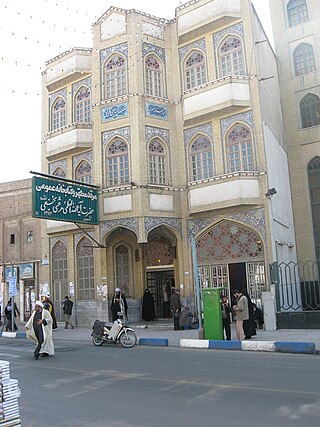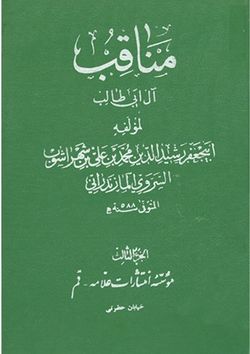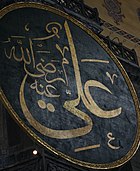
Mashhad, also spelled Mashad, is the second-most-populous city in Iran, located in the relatively remote north-east of the country about 900 kilometres from Tehran. It serves as the capital of Razavi Khorasan Province and has a population about 3,400,000, which includes the areas of Mashhad Taman and Torqabeh.

Nahj al-Balagha is the best-known collection of sermons, letters, and sayings attributed to Ali ibn Abi Talib, fourth Rashidun Caliph, first Shia Imam and the cousin and son-in-law of the Islamic prophet, Muhammad. It was collected by al-Sharif al-Radi, a renowned Shia scholar in the tenth century AD. Known for its moral aphorisms and eloquent content, Nahj al-Balagha is widely studied in the Islamic world and has considerably influenced the field of Arabic literature and rhetoric. Ibn Abil-Hadid, the author of an in-depth commentary on the book, believes that Nahj al-Balagha is "above the words of men and below the words of God." The authenticity of Nahj al-Balagha has long been the subject of lively polemic debates, though recent academic research suggests that most of the content can indeed be attributed to Ali.

The Central Library of Astan Quds Razavi is a large library in Mashad, Iran. Established before 1457, it holds over 1.1 million volumes. It is an international center for Islamic research, containing numerous manuscripts and rare works of antiquity of Islamic history.

Bihar al-Anwar is a comprehensive collection of traditions (ahadith) compiled by Shia scholar Mohammad-Baqer Majlesi, known as Allama Majlisi. It is a hadith collection as the secondary source used beside the Four Books. Bihar al-Anwar which a compendium of Hadiths, historical subjects and commentaries on many Qur'anic verses, completed between 1106 AH and 1110 AH.
Abū Jaʿfar Muḥammad ibn Yaʿqūb ibn Isḥāq al-Kulaynī ar-Rāzī was a Persian Shia hadith collector.
Sharh Nahj al-Balagha is Sheikh Muhammad 'Abduh's commentary on Sharif Razi's anthology Nahj al-Balagha—Peak of Eloquence—a collection of sayings attributed to Ali.

Astan Quds Razavi is a bonyad based at Mashhad, Iran. It is the administrative organization which manages the Imam Reza shrine and various institutions which belong to the organization.

The Imam Reza shrine in Mashhad, Iran, is a complex which contains the mausoleum of Imam Reza, the eighth Imam of Twelver Shias. It is the largest mosque in the world by area. Also contained within the complex are the Goharshad Mosque, a museum, a library, four seminaries, a cemetery, the Razavi University of Islamic Sciences, a dining hall for pilgrims, vast prayer halls, and other buildings.
Abū al-Qāsim ʿAlī ibn al-Ḥusayn al-Sharīf al-Murtaḍā (commonly known as: Sharīf Murtaḍā, Sayyid Murtaḍā, also popular as ʿAlam al-Hudā was one of the greatest Shia scholars of his time and was one of the students of Shaykh al-Mufīd. He was the elder brother of Al-Sharif al-Radi, the compiler of Nahj al-Balagha. He was four years older than his brother. He lived during the era of Buyid dynasty. It was the golden age of Arabic literature, and great poets Al-Ma'arri were among his contemporaries.

Grand Ayatollah Sayyed Abdullah Al-Musawi Al-Shirazi was a Grand Ayatollah of Twelver Shi'a Islam.

The Ayatollah Marashi Najafi Library, in Qom, is the third largest library in Iran, after the Central Library of Astan Quds Razavi, and the Library of Parliament, as well as being the world's third largest Islamic library, with more than 250,000 books, 25,000 of them online.
Al-Sayyid Moḥammad Mehdī Baḥr al-ʿUlūm or Bahrululoom (Arabic: السید محمد مهدی بحرالعلوم) was a mystic and a Shiite religious authority in the 12th and 13th centuries AH.
Khasais of Amir Al Momenin or Khasais-e-Ali is a book on virtues and moral characters of Imam Ali. The book was written by Ahmad Ibn Shoaeib Nisai. He was concerned in the book with the place of Ali and his relation to Muhammad.

Manaqib Ale Abi Talib is a book written by the Shi'a Muslim scholar Ibn Shahr Ashub.
The Fifteen Whispered Prayers, also known as The Fifteen Munajat, is a collection of fifteen prayers attributed to Ali ibn Husayn Zayn al-Abidin, the fourth Imam of Shia Muslims. Imam Sajjad is also the author of Al-Sahifa al-Sajjadiyya, another collection of prayers, and some researchers regard the whispered prayers as a supplementary part of the latter collection.
Sayyed Radhi ud-Deen Ali ibn Musa ibn Tawus al Hasani wal Husaini commonly called Sayyed Ibn Tawus was a Shiite jurist, theologian, historian and astrologer. He was a descendant of Hasan ibn Ali through his father and a descendant of Husain ibn Ali through his mother. It is said that he met the twelfth Shiite imam, Muhammad al-Mahdi, who according to Shiites is living in occultation. He is known for his library and his numerous works which are still available in their original form and help us learn about the interests of Muslim scholars at the end of the Abbasid era.

Abū al-Ḥasan Muḥammad bin al-Ḥusayn bin Mūsā, also known as al-Sharīf al-Raḍī was a Shia scholar and poet.
The following is a timeline of the history of the city of Mashhad, Iran.

Ahmad Marvi is an Iranian Twelver Shia cleric, former general and former police officer who has recently been appointed as the custodian of Astan Quds Razavi by the decree of the supreme leader of Iran, Seyyed Ali Khamenei.











